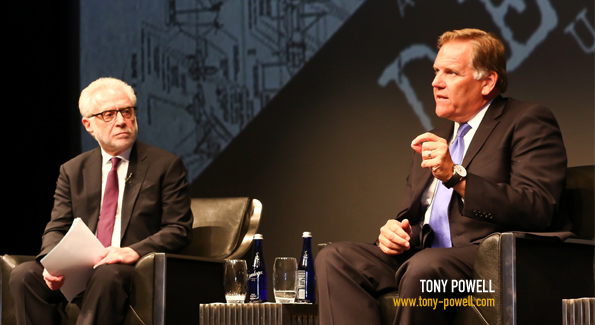CNN’s new original series,“Declassified,” sheds light on old covert operations.

Wolf Blitzer and Mike Rogers (Photo by Tony Powell)
A captivated audience listened as retired KGB Major General Oleg Kalugin recounted bugging a State Department conference room when he worked as a press officer at the Soviet Embassy many years ago. “I recall I was sitting on the bench right across from the State Department building – it was about 100 yards away – just checking if the bug worked. It worked very well. I heard everything. We tried to do it in the FBI building, but we failed.” Kalugin’s story is one of many featured on CNN’s new original series “DECLASSIFIED: Untold Stories of American Spies.” Jeff Zucker, President of CNN Worldwide, hosted a premiere of the show to give a Washington audience gathered at the Newseum a taste of what’s in store for the eight-part series that debuted June 19.
Each episode is built around a newly- declassified mission told firsthand by the agents who lived it.The premiere told the story of former C.I.A. case officer Marti Peterson who spent two years in Moscow at the U.S. Embassy posing as a clerk while leading a dangerous double life. She was arrested on a railroad bridge in 1977, but because of diplomatic immunity, was sent home after a brief detention. “A year later, it came out in the Washington Post, and it was big news,” Peterson recalled. “But It only lasted about five minutes, and I said, ‘That’s just Soviet propaganda,’ and nobody really cared. I went on with my covert assignments.”
Surprisingly, Peterson’s reassignment put her back in the Soviet Union where she was obviously known to the “enemy.” Retired senior C.I.A. officer Mark Kelton explained that cover can never be maintained wholly throughout an agent’s career. “At some point, your cover is lost by whatever means.” Kelton went on to describe the value of keeping a solid covert agent on the job, emphasizing that intelligence operations are a craft that can’t be taught, but rather learned with practice. “Experienced people are the premium, so Marti’s skills, when she got to be mid-career and after that, were absolutely essential. There were roles that she could work in that were very effective, and the cover was not that important.” She also got remarried and changed her name. That helped, too.
In cases like Peterson’s, there is cause to wonder if she had any reservations or regrets about the work she did. “I don’t think I ever questioned that what I was doing was the right thing, even though we were asking people to be traitors to their country,” Peterson said.“As trainees, I remember we had these kind of discussions, but there was a greater good here for the winning side. I think that’s what we all believed in.”We do however, suspect she is still troubled by certain memories – you’ll need to tune in to find out for yourself.
Considering this series exposes elements of the C.I.A.’s clandestine operations, it was former chairman of the House Intelligence Committee and the series’ host Mike Rogers who shed light on how much covert mission information was shared with Congress. ”Quite a bit” he said, “I think it does depend on the chairman and the chairman’s interests.You would be surprised. We were very clued in.” Since the C.I.A. revealed a substantial amount of information, we asked Peterson to tell us something we didn’t know. In response, she detailed an affair she had with a State Department officer in Moscow and explained that the only other person who knew about it was “a KGB guard who stood on the corner there at the Embassy because he’d see me go out to the parking lot and get in my car and if somebody walked out with me I’d have to drive away. But then, I’d come back. It was a covert operation.” Only the KGB noticed… there’s that.
Major General Kalugin reminded the audience that we live in a different world now, for better or worse.“When I was a student at Columbia University, I stood in line to visit the F.B.I. Headquarters. They never asked who I was. No one asked a single question,” he remembered. “That was the beauty of America.”
This article appeared in the Summer issue of Washington Life:




